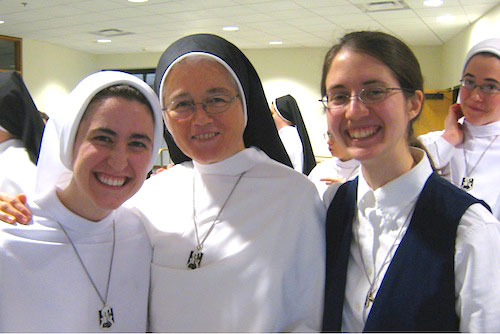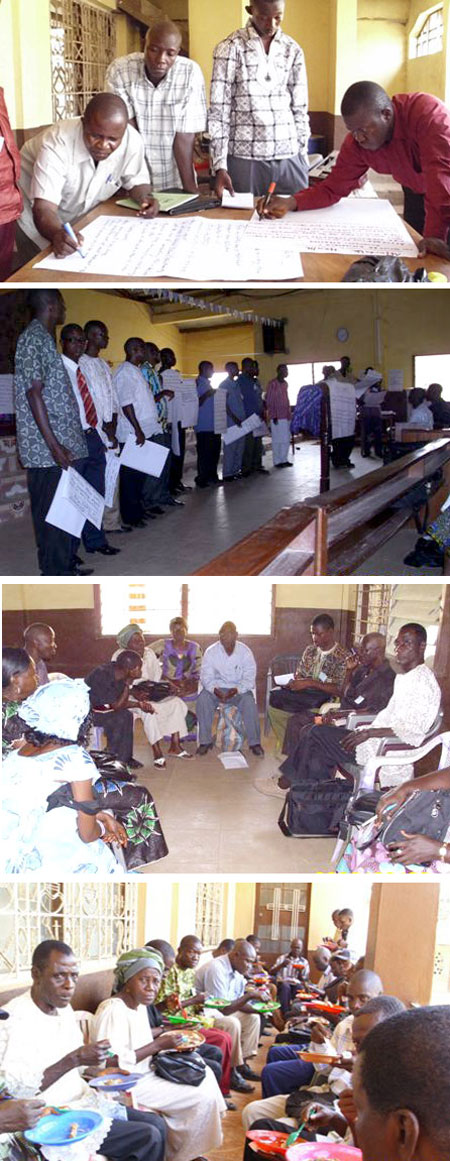07 Mar Raudales Family Now in the US
Francisco and Maira Raudales, along with son Jimmy, have moved to Miami and are now residents of the United States. Francisco was superintendent of Honduras Conference 1997-2009.
(260) 356-2312
Francisco and Maira Raudales, along with son Jimmy, have moved to Miami and are now residents of the United States. Francisco was superintendent of Honduras Conference 1997-2009.
Several students from Huntington University plan to spend their spring break traveling. Some will see the lights of the big city, while others will venture to exotic locations–all with the goal to serve.
HU’s Joe Mertz Center for Volunteer Service will send three teams of students to Port-au-Prince, Haiti; Philadelphia; and Zacapa, Guatemala, from March 12-16. These groups will volunteer in area orphanages, clinics, schools, and with local missionaries. The HU softball team will travel to Tucson, Ariz., where head coach Doug Gower hopes to find small ways for the softball team to minister on top of training for the upcoming season.
“We try to do little things while traveling such as anonymously pay for an unsuspecting person’s meal when we go out to eat,” Gower said. “It could be an older couple or anyone, really. We try to make it a team choice. We try to represent Huntington in all we do while out for an extended period.”
Jessica Stearns, an HU graduate counseling student and assistant for the Joe Mertz Center, organized all the mission trips this year.
Rebecca McIlwain, a sophomore psychology major from Albany, Ind., will lead six students in a trip to Guatemala, where they will volunteer with His Hands International Inc.
The Guatemala team will serve lunch to the community and volunteer at the local children’s home and malnutrition center.
Mallory Jones, resident director for Baker and Roush halls, also feels exhilarated about advising a missions team to Haiti. Jones and her team will work with Mission of Hope, one of the largest missions organizations in Haiti.
“I have a big passion for travel, ministry and other cultures, so it was an easy answer to give when I was asked if I wanted to lead the trip,” she said. “I want to help students experience something that could impact their lives and change their worldviews.”
The group traveling to Philadelphia will serve with the Center for Student Missions, which is an organization that connects students wanting to volunteer with various projects around the community. The team also will assist with afterschool programs.
“I hope our team will be able to get out of our comfort zone and get a feel for inner-city life in the U.S.,” said Doris Walker, student leader for the trip and a junior entrepreneurial small business management and business management double major from Kandern, Germany. “I want our team to see how the Philadelphia inner-city population experiences poverty and for them to experience Christ in that environment.”

Members of the Sisters of Mary order.
In 1980, the Grayston Avenue UB church in Huntington, Ind., bought the former St. Felix Friary. They changed their name to Good Shepherd UB church, and moved into the former monastery for the next 20 years.
Good Shepherd left the property in 2009 and began meeting in temporary locations. Now using the name The Well, the congregation holds services at the Huntington YMCA while looking for a permanent location.
In 2010, they sold the friary to the Mary Cross Tippman Foundation, run by a Catholic businessman in Fort Wayne, Ind. The foundation poured over $1 million into renovations. The foundation modernized the kitchens and restrooms, upgraded the wiring, painted, brought the facility up to code, and added new pews, statuary, an altar, and other items.
And now, it will become a nunnery. The Dominican Sisters of Mary, Mother of the Eucharist, an order founded 15 years ago and based in Ann Arbor, Mich. They will place about 40 novices in the west wing, which Good Shepherd used a a retreat center. The order states, “Our community exists for the salvation of souls and the building of the Church throughout the world.”
The order, which has about 100 sisters, focuses on teaching. Women joining the order go through an eight-year process before taking their final vows; they all earn a teaching degree during the formation process. The Huntington center, by providing housing for novices in the second and third years of the process, will relieve overcrowding at the main center in Ann Arbor.
The sisters serve in Catholic schools around the country, and currently work in six states: Michigan, Ohio, South Carolina, Texas, California, and Arizona. According to a local Catholic spokesman, they are very much in demand.
The friary was home to Father Solanus Casey 1946-1956, a Capuchin monk who has gone through the first of three stages toward sainthood in the Catholic church. His second-floor dorm room in the east wing has been kept the way it was when he lived there.
On Saturday, February 25, the Hillsdale UB church (Hillsdale, Mich.) held an awards program to conclude the Upwards Basketball/Cheerleading season. This was the third year for Upwards at Hillsdale UB, with about 250 elementary age children participating this year. Over 700 came out for the closing program in the Worship Center.
 Over 60 children responded to the invitation given at the conclusion of the awards program. Among them were a dozen players who made first-time commitments to Christ.
Over 60 children responded to the invitation given at the conclusion of the awards program. Among them were a dozen players who made first-time commitments to Christ.
Each year, the Hillsdale congregation has gained new families from the Upwards ministry. This season, Pastor Les Smith (right) coached a kindergarten team, and the family of one of his players are now regular attenders. The father is superintendent of the local school district.
 Leigh Pearson (right), Administrative Assistant at Sunfield Church (Sunfield, Mich.)
Leigh Pearson (right), Administrative Assistant at Sunfield Church (Sunfield, Mich.)
On Sunday, February 26, Sunfield UB church (Sunfield, Mich.) hosted a “Camp Living Waters Day” to promote summer camp and raise money to help send to summer camp area youth who may not otherwise be able to go and “experience God in His creation.”
Chad Saxton, Executive Director of Camp Living Waters, was our guest speaker. A “Silent Auction” was held, and the inside of the church was transformed into a makeshift Camp Living Waters. Picture were hung from the ceiling throughout the entire church showed smiling faces and activities available at camp. Areas throughout the church were renamed lodges or cabins that are actually at Camp Living Waters. The Kitchen became the Camp Store where camp-like refreshments–freshly made smores, rice krispie treats, trail mix, fruit snacks, popcorn, chips, juice boxes and hot chocolate–were served in lieu of the normal Sunday morning coffee and cookies.
 The Silent Auction was open from 9 am to 12 pm. We asked the congregation to provide auction items (services or goods). We had over 65 items to bid on–dinner and a movie with Pastor Randy Carpenter and his wife (right), lots and lots of home-baked goods (pies were going for over $40), lawn mowing services, goodie baskets, food baskets, and more. One small group made homemade lasagna and had it available for taste-testing, and then took orders to provide homemade lasagna, haircuts, bowling, tie blankets, kids’ toys, etc.
The Silent Auction was open from 9 am to 12 pm. We asked the congregation to provide auction items (services or goods). We had over 65 items to bid on–dinner and a movie with Pastor Randy Carpenter and his wife (right), lots and lots of home-baked goods (pies were going for over $40), lawn mowing services, goodie baskets, food baskets, and more. One small group made homemade lasagna and had it available for taste-testing, and then took orders to provide homemade lasagna, haircuts, bowling, tie blankets, kids’ toys, etc.
There was something for everyone! We sold every item and at the end of the day, we raised over $1,800 in scholarship money for summer camp. It was a great day and everyone had a lot of fun. We are excited that the success of the day will benefit many youth to possibly meet Jesus for the first time or grow closer in a relationship with him while at camp this summer.
David Gregg has been named supply pastor of Lighthouse UB church in Williamston, Mich., effective February 1, 2012. Since 2000, he had been on staff with First Baptist church in Williamston, with whom he was ordained in 2003. He and his wife, Wendy, has four children ranging in age from 19 to 23.
Huntington University is seeking submissions for its first annual Fandana Film Festival on August 10-11, 2012.
Filmmakers can submit works for the film festival in the categories of narrative, documentary, and animation, in addition to a special category just for high school students. Awards include:
The winners will also have their films shown on the main stage jumbotron in front of thousands during the Fandana Festival weekend.
The deadline for submissions is June 1. The submission fee is $25. A late registration fee of $35 is available through July 1.
Huntington’s hit music, art and film festival, Fandana Festival, is returning this year on Aug. 10-11, featuring Christian recording artist Chris Tomlin and more than 50 bands on multiple stages.
Mary Mentzer, 94, passed away January 31, 2012, at a nursing home in Carlisle, Pa. She was the wife of Rev. Fred Mentzer, who passed away in 1979; and the mother of Rev. Robert Mentzer, a retired UB minister. Funeral services were held February 3, 2012 in Chambersburg, Pa., with Rev Murray Stevens, senior pastor of St. James UB church (Chambersburg) officiating.
Huntington University is launching a new innovative bachelor’s degree program in heuristics this fall.
Heuristics is the practice of discovery, understanding, and problem solving. The program’s goal is to develop key cognitive skills for students entering a 21st century workforce, particularly improving creativity, critical thinking, collaboration, and communication skills.
The courses will be project-based and rely significantly on partnerships within the community.
The Bachelor of Arts in Heuristics, Design, and Technology degree also aims to build on New Tech Network programs, which are becoming increasingly popular in area high schools. New Tech Network schools teach students to think critically and to collaborate.
The new degree will launch in the 2012-2013 school year with courses such:
For more information, visit huntington.edu/heuristics.

Sierra Leone Conference held a planning retreat February 1-4, 2012, in Bo. Over 150 people participated, representing churches and groups throughout the country. Bishop John Pessima says the final report is still being finalized.